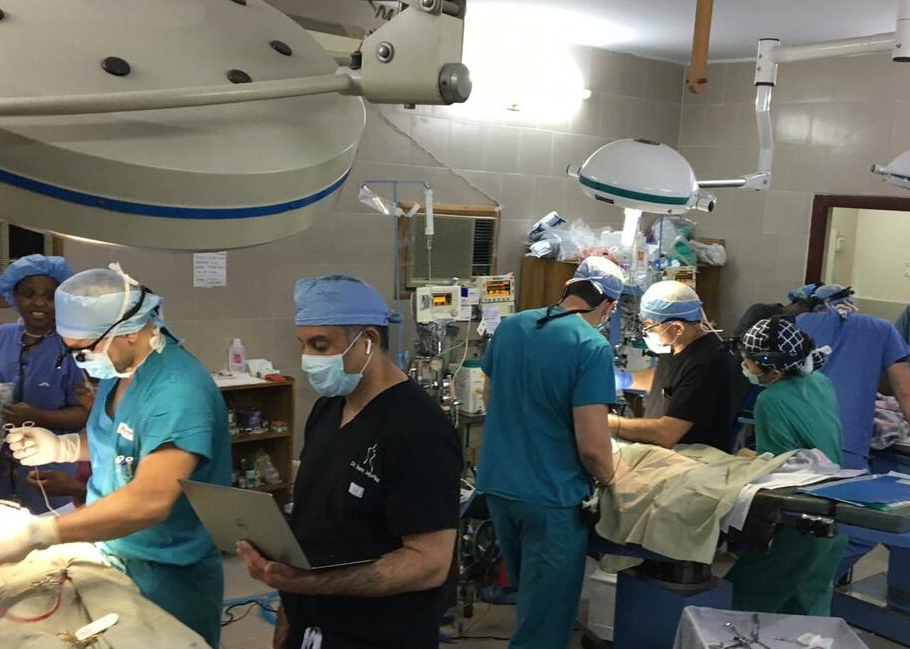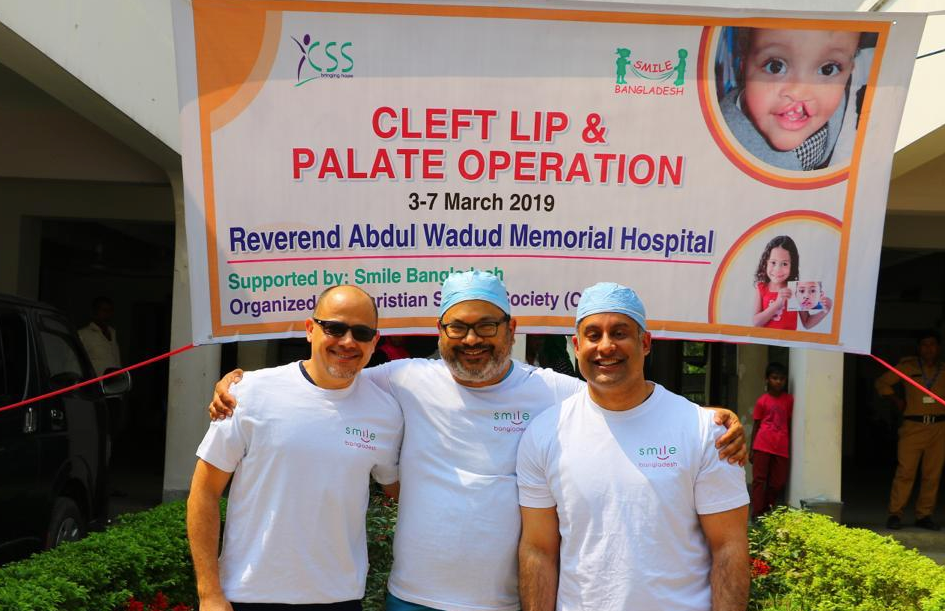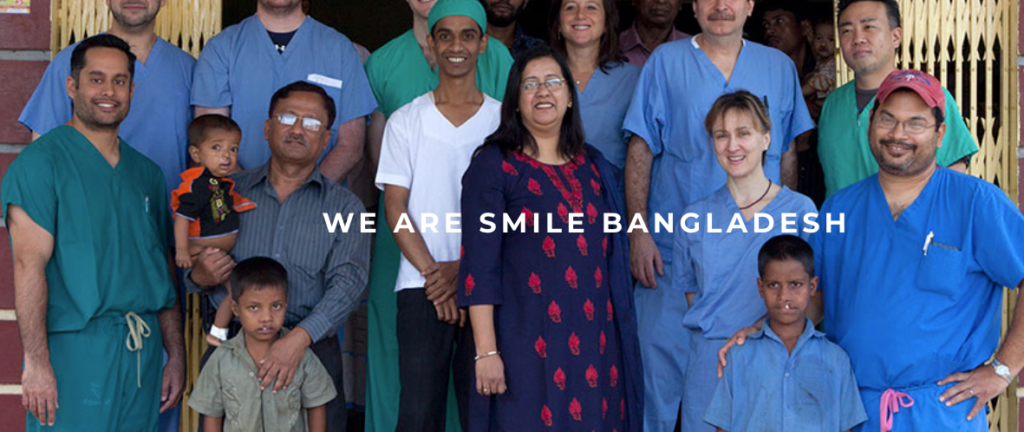Notice: WP_Theme_JSON_Resolver::get_user_data(): Error when decoding a theme.json schema for user data. Syntax error in /home/rushprnewscom-328/public_html/prod/wp-includes/functions.php on line 6114
In Bangladesh, approximately 300,000 children are afflicted with cleft lip and palate, also known as orofacial cleft. This condition is a congenital facial deformity that occurs when the muscle and skin of the upper lip do not fuse correctly. Orofacial cleft is one of the most common congenital disabilities.
This condition can be fixed with a one-hour surgery, not only providing physical relief for patients but also potentially erasing social stigmas. Unfortunately, Bangladesh struggles with mass poverty, and it can be challenging for families to afford surgery for the afflicted. There is also a severe shortage of doctors who are trained to treat orofacial cleft.
Smile Bangladesh seeks to remedy this issue by sending trained professionals on mission trips to Bangladesh to help as many patients as they can. Dr. Jejurikar is a member at large of Smile Bangladesh and works diligently to help patients old and young to smile again.
The stigma of orofacial cleft in Bangladesh
Orofacial cleft occurs when the bones and muscle that makes up the roof of the mouth do not fuse properly. This can significantly affect one’s ability to eat or engage in speech properly.
In Bangladesh, the condition also comes with a societal stigma due to its facial disfigurement. Many traditional cultures like Bangladesh ostracize children with cleft lip. This, in turn, leads to social isolation from the whole of Bengali society.

Mothers of these children also face superstitious backlash, as it’s believed that orofacial cleft only occurs when pregnant women cut vegetables and fish during an eclipse.
Children born with cleft deformities spend their entire childhood up until early adulthood facing a host of medical-related issues. Many people with cleft lip must receive dental implants, speech therapy, orthodontics, adjunctive procedures, dental implants, and rhinoplasty as their cleft develops.
Unfortunately, Bangladesh does not offer a comprehensive care system for cleft patients, leaving many families to deal with physical and societal implications for the rest of their lives.
What are the symptoms of orofacial cleft?
Cleft lip is far more than just a cosmetic abnormality. Other complications that are often associated with cleft lip include:
Speech and language delay
Because there is an opening between the mouth and the lip, muscle function may suffer as a result, which in turn could lead to abnormal speech or a delay in speech.
Feeding difficulties
Feeding difficulties are an affliction that patients with a cleft palate (not to be confused with a cleft lip), tend to struggle with. A cleft palate occurs when there is an opening in the roof of the mouth. When this happens, infants may not be able to suckle correctly, which could lead to far more severe implications.
Dental problems
The abnormality of cleft lip may make it difficult for teeth to form properly, often making it necessary for patients to receive orthodontic treatment.
Ear infections and hearing loss
This particular symptom may come as a surprise to some, but ear infections and even hearing loss can occur due to cleft lip. This is because of dysfunction between the tube that connects the middle ear and the throat. Repeat infections could eventually lead to the loss of hearing.
Orofacial cleft treatment
For infants who only suffer from cleft lip with no other complications, a surgeon can easily repair the abnormality within the first few months of the child’s life. During the procedure, the plastic surgeon utilizes a special technique to suture the two sides of the lip together.
While scarring is inevitable, it can be minimized when done at the hands of a skilled surgeon. It may take a second procedure to ensure the lip is connected correctly.
What can patients eat after surgery?
Following surgery, patients should avoid hard foods to give their mouths time to heal. For children, the surgeon over the operation may permit bottle feedings, breast-feeding, or cup feedings.
During the recovery period, children are allowed to play calmly for the first one to two weeks post-surgery (understandably, this will be a difficult concept to communicate to a child, therefore around-the-clock adult supervision is recommended). Children should avoid “mouth toys” for the same reasons.
Helping those in need, one smile at a time
Smile Bangladesh is a New Jersey-based nonprofit medical organization dedicated to caring for children and adults who struggle with facial deformities in Bangladesh and across the globe.
Statistics show there are less than 30 surgeons across Bangladesh that have received formal training in cleft surgery. To put that number into perspective, there are more than 300,000 known cases of cleft lip in children and adults in Bangladesh, meaning that each surgeon would have to take on 10,000 patients each.

Because of the great need for qualified cosmetic surgeons in Bangladesh, Smile Bangladesh plans numerous mission trips out of the United States every year to do what they can. The group has participated in two dozen trips to Bangladesh as of the time of this writing, with a future trip planned to East-West Medical College in Dhaka, Bangladesh, in March of 2020.
Faced with a momentous task, Smile Bangladesh plans to provide relief for patients by developing a multidisciplinary cleft center dedicated to helping as many patients as they can.
When able, Dr. Jejurikar travels with Smile Bangladesh to provide cleft surgery for patients in need. Besides Dr. Jejurikar, Smile Bangladesh is made up of a dynamic team of caring surgeons who make it their top priority to change the lives of every patient that enters their care.
Giving back
The life-changing cleft surgeries performed by the surgeons of Smile Bangladesh are giving people their lives back, one smile at a time. With members like Dr. Jejuirkar along with the rest of his highly qualified colleagues at the helm, Smile Bangladesh can only be expected to grow and expand over the coming years.
If you feel inspired by the work being done in Bangladesh, and you wish to contribute, you can donate to Smile Bangladesh here. Every dollar you donate will go towards changing a life.
About Dr. Jejurikar
Dr. Sameer Jejurikar is one of the most recognized board-certified cosmetic surgeons in Dallas. He specializes in a wide range of cosmetic surgeries, including Mohs Reconstruction Surgery, Mommy Makeovers, and Brazilian Butt Lifts, amongst others.
Dr. Jejurikar has undergone extensive training at the Manhattan Eye, Ear, and Throat Hospital, knowledge he puts to use every day in his Dallas practice. He has also graduated from the University of Michigan Medical School as one of its top students. During his time there, he was elected to the Alpha Omega Alpha Honor Society.
Dr. Jejurikar belongs to a host of organizations, including the American Society of Plastic Surgeons (ASPS), American Society for Aesthetic Plastic Surgery (ASAPS), and the Dallas Society of Plastic Surgeons.
One of his greatest accomplishments is joining Smile Bangladesh, where he gives back by traveling to Bangladesh to provide cleft surgery to patients in need. With each surgery completed, a life is changed for the better.
Follow Dr. Jejurikar on LinkedIn




